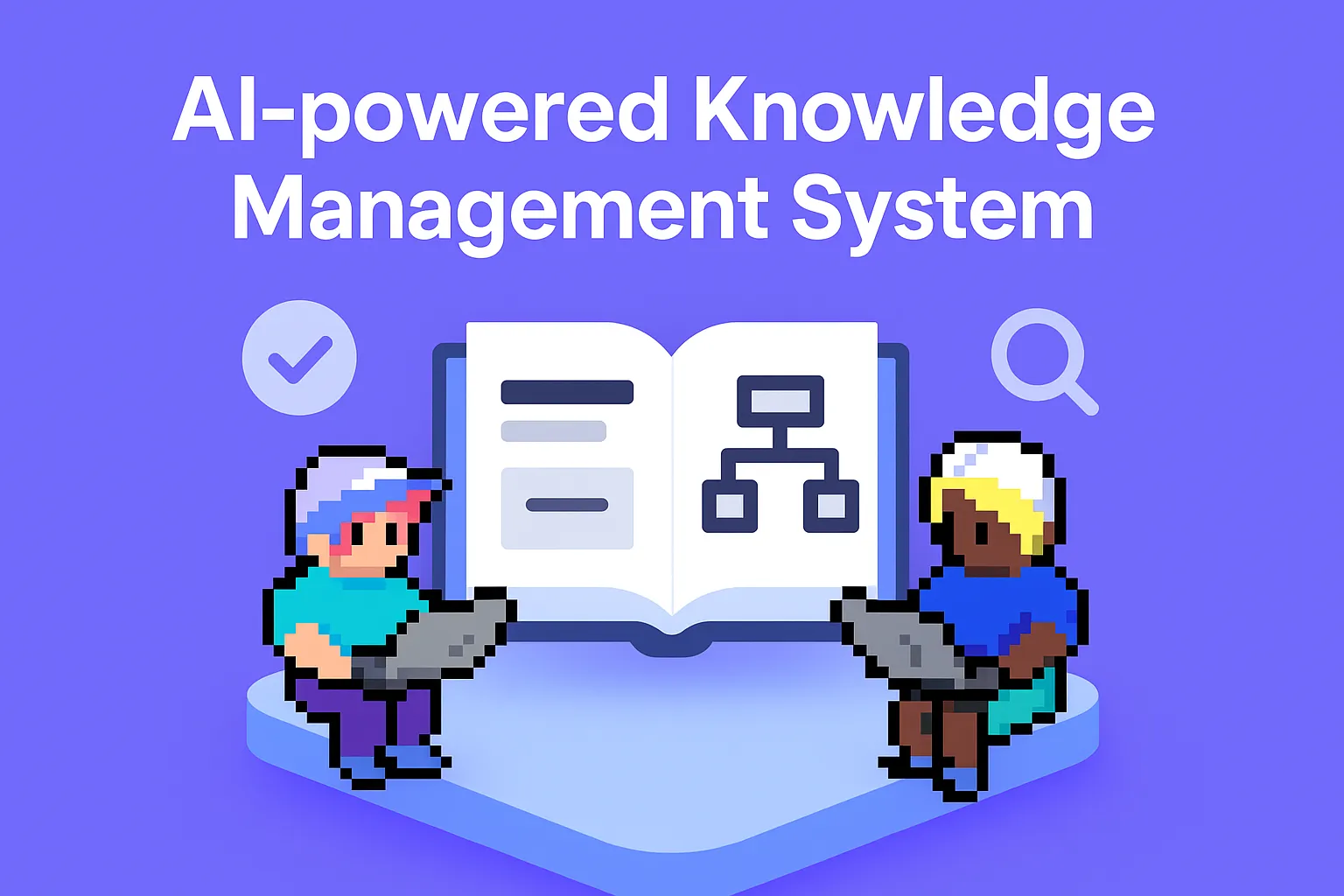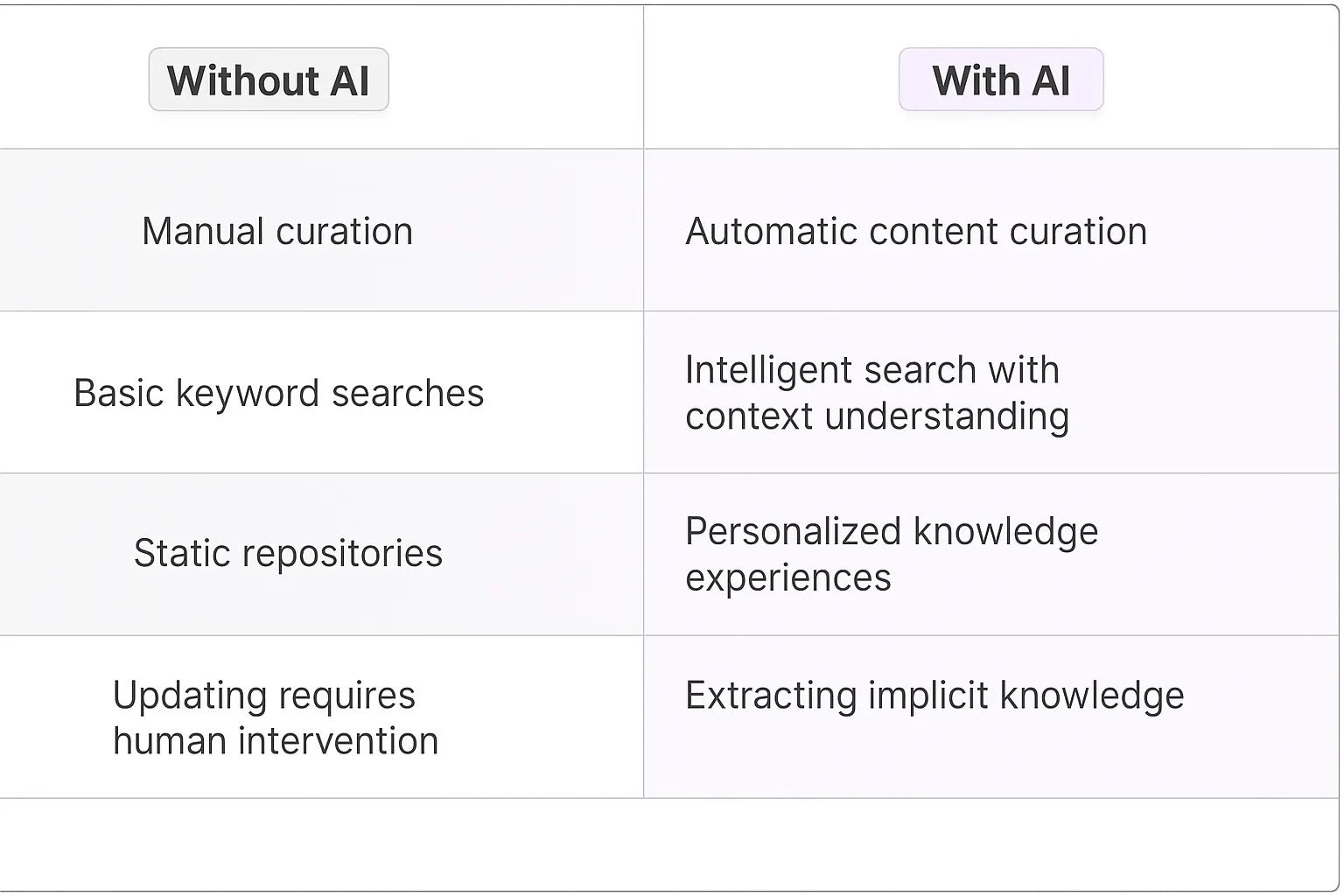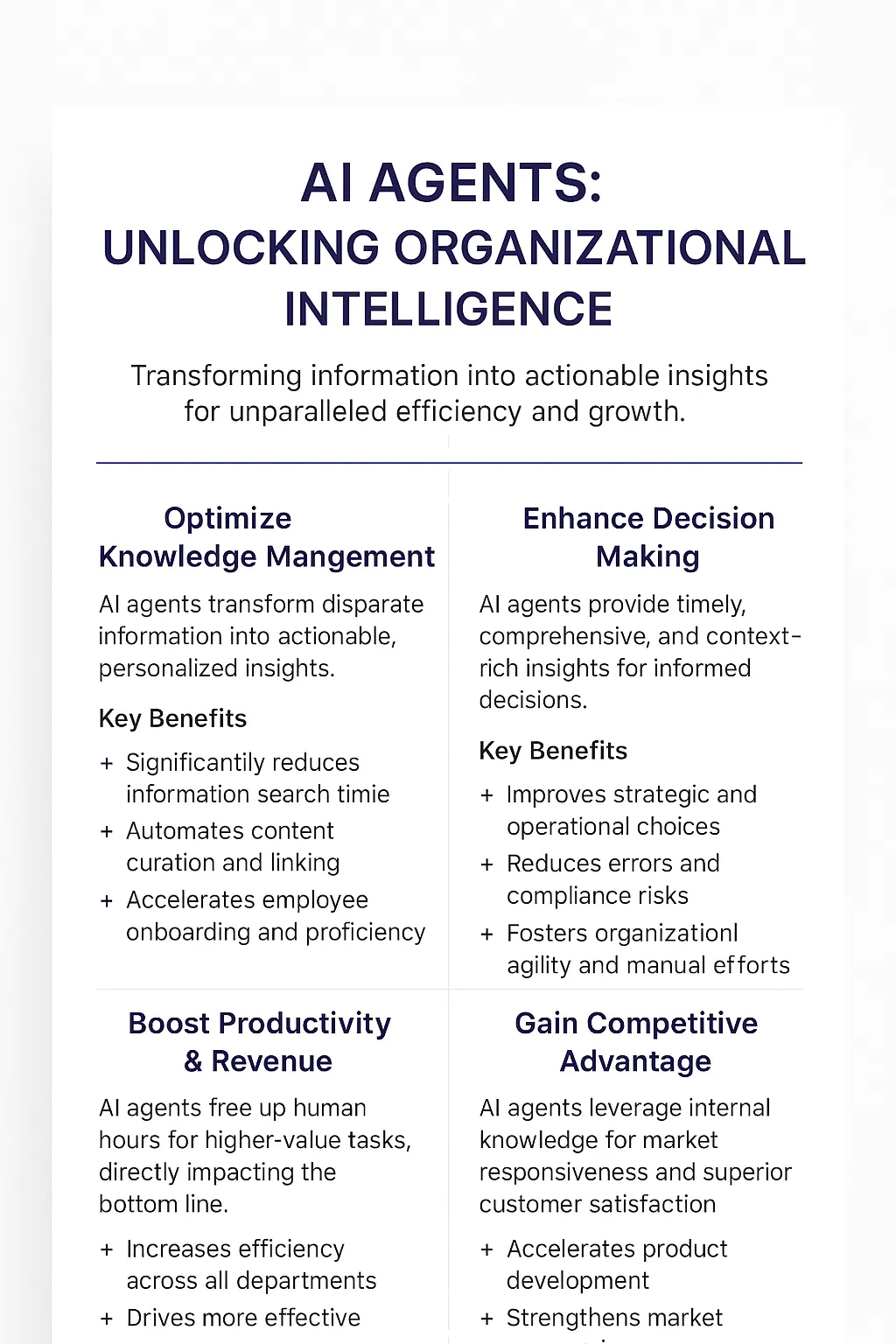Knowledge Management System Optimization
Revolutionizing Organizational Knowledge with AI-Powered Systems
What is Knowledge Management System Optimization?
Knowledge Management System Optimization is the process of enhancing an organization's ability to capture, organize, and leverage its collective wisdom. It's about turning information overload into actionable insights. With AI agents, this optimization goes into overdrive. These digital teammates don't just store data; they understand it, connect it, and serve it up in ways that amplify human intelligence. It's like giving your entire organization a cognitive upgrade.
Key Features of Knowledge Management System Optimization
The secret sauce of AI-powered knowledge management lies in its key features. First, there's intelligent search that understands context and intent, not just keywords. It's like having a mind-reading librarian at your fingertips. Then you've got automatic content curation and tagging, which organizes information faster and more accurately than any human could. Personalization at scale ensures each user gets a tailored knowledge experience. And perhaps most exciting, these systems can turn implicit knowledge into explicit, shareable information, unlocking insights that were previously trapped in employees' heads.

Benefits of AI Agents for Knowledge Management System Optimization
What would have been used before AI Agents?
Before AI agents entered the scene, knowledge management systems were like clunky libraries with outdated card catalogs. Companies relied on manual curation, basic search algorithms, and the collective memory of long-time employees. It was a world of information silos, where finding the right piece of data felt like searching for a needle in a digital haystack.
Teams would spend hours sifting through documents, emails, and shared drives. The go-to solution? Usually a mix of keyword searches, tagging systems, and the office "knowledge guru" – that one person who somehow remembered where everything was stored. But as data grew exponentially, these methods started showing their age, like a flip phone in the era of smartphones.
What are the benefits of AI Agents?
Enter AI agents – the Marie Kondos of the digital world, sparking joy in knowledge management. These digital teammates are transforming how we interact with information, making knowledge management systems feel less like dusty archives and more like Iron Man's J.A.R.V.I.S.
First off, AI agents bring context-aware search to the table. They don't just match keywords; they understand intent. It's like having a mind-reading librarian who knows exactly which book you need, even when you're not sure yourself. This level of intuition slashes search times and boosts productivity across the board.
But that's just the appetizer. The main course is how AI agents actively curate and connect information. They're constantly working behind the scenes, identifying patterns, linking related concepts, and surfacing relevant insights. Imagine if your entire company's knowledge base was constantly being reorganized and optimized by an army of tireless, brilliant interns. That's what AI agents bring to the table.
Perhaps the most game-changing benefit is personalization at scale. AI agents learn from each user's behavior, tailoring the knowledge management experience to individual needs and preferences. It's like having a personal knowledge concierge who knows your work style better than you do.
And let's talk about the holy grail of knowledge management: turning implicit knowledge into explicit, shareable information. AI agents can analyze communication patterns, document usage, and even code repositories to extract valuable insights that would otherwise remain locked in employees' heads. It's like being able to download the collective expertise of your entire organization.
The result? A knowledge ecosystem that's alive, evolving, and incredibly powerful. It's not just about finding information faster; it's about unlocking new connections, fostering innovation, and creating a true learning organization. In the world of AI-powered knowledge management, every employee becomes a knowledge worker on steroids, armed with the collective intelligence of the entire company at their fingertips.
As we move into this new era, the companies that harness the power of AI agents in their knowledge management systems won't just have a competitive edge – they'll be playing a different game entirely. It's not about incremental improvements; it's about exponential leaps in how we create, share, and leverage knowledge. Welcome to the future of work, where your digital teammates are always one step ahead, ensuring you have the right information at the right time, every time.

Potential Use Cases of AI Agents with Knowledge Management Systems
Processes
Knowledge management systems are the unsung heroes of organizational efficiency, but they often fall short of their potential. Enter AI agents - the digital teammates that can transform these systems from static repositories into dynamic, intelligent knowledge hubs.
One key process where AI agents shine is in content organization and tagging. Instead of relying on humans to manually categorize and tag every piece of information, AI agents can analyze content in real-time, extracting key concepts and applying relevant tags. This not only saves time but also ensures consistency and depth in categorization that humans often struggle to maintain.
Another critical process is knowledge gap identification. AI agents can continuously scan the knowledge base, cross-referencing it with current projects, market trends, and user queries. By doing so, they can pinpoint areas where the organization's knowledge is lacking or outdated, prompting timely updates and expansions of the knowledge base.
Tasks
When it comes to specific tasks, AI agents are game-changers for knowledge management systems. Take search and retrieval, for instance. Traditional keyword searches often fall flat, but AI agents can understand context and intent, delivering more accurate and relevant results. They can even anticipate user needs, proactively suggesting related information that the user might not have thought to search for.
Content summarization is another task where AI agents excel. Instead of users having to wade through lengthy documents, AI can generate concise summaries, highlighting key points and actionable insights. This is particularly valuable for time-pressed executives or team members onboarding to new projects.
AI agents can also tackle the task of knowledge validation and updating. They can automatically fact-check information against trusted sources, flag outdated content, and even suggest updates based on new developments in the field. This ensures that the knowledge base remains a reliable, up-to-date resource.
Lastly, AI agents can personalize the knowledge management experience for each user. By analyzing individual usage patterns, roles, and project involvement, they can curate personalized dashboards and push relevant information proactively, turning the knowledge management system from a passive tool into an active partner in each employee's workflow.
The integration of AI agents into knowledge management systems isn't just an incremental improvement - it's a fundamental shift in how organizations capture, manage, and leverage their collective intelligence. As these systems evolve, we'll see a new era of organizational learning and decision-making, where knowledge flows freely and is always at everyone's fingertips.

Industry Use Cases: AI Agents Transforming Knowledge Management
AI agents are reshaping how organizations handle knowledge management, turning static systems into dynamic, intelligent ecosystems. These digital teammates aren't just fancy search engines; they're becoming integral parts of how companies capture, organize, and leverage their collective wisdom. Let's dive into some real-world scenarios where AI agents are making waves in knowledge management across different sectors.
From tech startups to Fortune 500 giants, businesses are tapping into the power of AI to solve age-old information bottlenecks. We're seeing AI agents that can sift through terabytes of unstructured data, surface relevant insights on demand, and even predict what information a team might need before they ask for it. It's like having a brilliant librarian who not only knows where every book is but also understands the context of your project and can connect dots you didn't even know existed.
But it's not just about finding information faster. These AI agents are changing the game in how knowledge is created and shared within organizations. They're facilitating cross-pollination of ideas between departments, breaking down silos, and fostering a culture of continuous learning. The result? Companies are becoming more agile, innovative, and responsive to market changes.
Let's explore how different industries are leveraging AI agents to supercharge their knowledge management systems and gain a competitive edge in their respective fields. From data analysis to predictive insights, these systems are transforming how organizations operate.
Legal Industry: Transforming Case Law Management with AI
Let's dive into how Knowledge Management System Optimization AI Agents are reshaping the legal industry. Law firms are drowning in data - case files, precedents, and statutes pile up faster than associates can bill hours. Enter the AI-powered knowledge management system.
These digital teammates aren't just glorified search engines. They're more like the firm's collective brain on steroids. They ingest vast libraries of legal documents, court decisions, and internal memos, then weave this information into a living, breathing knowledge base.
Here's where it gets interesting: These AI agents don't just store information; they understand context and relationships. When a lawyer is prepping for a complex intellectual property case, the AI can pull relevant precedents, flag potential pitfalls, and even suggest novel arguments based on emerging legal trends.
But the real magic happens in the background. The AI is constantly optimizing the knowledge base, identifying gaps in the firm's collective expertise, suggesting areas for further research, and even predicting future legal trends based on patterns in case law and legislation.
For law firms, this is a game-changer. It levels the playing field, allowing smaller firms to punch above their weight class. It also transforms how lawyers work, shifting their focus from information gathering to high-level strategy and client interaction.
The ripple effects are profound. Faster case preparation means lower costs for clients. More comprehensive research leads to stronger arguments and better outcomes. And as the AI learns and improves, it creates a virtuous cycle of ever-increasing efficiency and effectiveness.
This isn't just about making lawyers more productive. It's about fundamentally reimagining how legal knowledge is created, shared, and applied. In an industry where knowledge truly is power, AI-optimized knowledge management systems aren't just tools - they're the new competitive advantage.
Manufacturing: AI-Driven Knowledge Management Reshapes Production
The manufacturing industry is undergoing a seismic shift, and AI-powered knowledge management systems are at the epicenter. These digital teammates are transforming how factories operate, innovate, and compete in a global market.
Think about the complexity of modern manufacturing. You've got intricate supply chains, ever-changing production processes, and a constant need for innovation. Traditional knowledge management systems simply can't keep up. They're like trying to navigate a Tesla factory with a paper map.
AI agents, on the other hand, are built for this complexity. They don't just store information; they understand it, connect it, and use it to drive real-time decision making. Here's where it gets interesting:
These AI systems are constantly learning from every aspect of the production process. They're analyzing data from IoT sensors, studying quality control reports, and even parsing through employee feedback. The result? A living, breathing knowledge base that's always up-to-date and incredibly nuanced.
But here's the kicker: these AI agents aren't just passive repositories. They're active participants in the manufacturing process. When a production line hits a snag, the AI can instantly pull up relevant troubleshooting guides, suggest optimizations based on historical data, or even predict potential issues before they occur.
This level of intelligence is transforming how manufacturers innovate. The AI can identify patterns across different products and processes, suggesting cross-pollination of ideas that human experts might miss. It's like having a R&D team that never sleeps and has perfect recall of every experiment ever conducted.
The impact on the workforce is profound. Engineers and technicians are no longer bogged down in information retrieval. Instead, they're free to focus on high-level problem solving and innovation. The AI becomes a force multiplier, allowing each employee to leverage the collective knowledge of the entire organization.
For manufacturing leaders, this isn't just about efficiency gains. It's about creating a sustainable competitive advantage. In an industry where margins are tight and innovation is key, AI-optimized knowledge management isn't a luxury - it's a necessity for survival and growth.
We're moving towards a future where factories aren't just smart - they're wise. They learn from every success and failure, constantly refining their processes and pushing the boundaries of what's possible. In this new paradigm, the most valuable asset isn't machinery or raw materials - it's the AI-powered knowledge that drives everything forward. Quality control becomes proactive rather than reactive, ensuring excellence at every step.
Considerations
Technical Challenges
Implementing a Knowledge Management System Optimization AI Agent isn't a walk in the park. It's more like trying to teach a robot to dance salsa while juggling flaming torches. The technical hurdles are real, and they're not for the faint of heart.
First up, data integration. Your AI agent needs to play nice with a smorgasbord of data sources - from dusty old databases to shiny new cloud platforms. It's like trying to get a group of cats to form a synchronized swimming team. Each system speaks its own language, has its own quirks, and probably doesn't want to share its toys.
Then there's the machine learning model itself. Training this bad boy is like trying to teach a toddler quantum physics. You need massive amounts of high-quality, relevant data. And let's be real, most companies' data is about as organized as a teenager's bedroom. You'll spend more time cleaning and prepping data than actually building the model.
Don't forget about scalability. Your AI agent needs to handle everything from a trickle of requests to a tsunami of queries without breaking a sweat. It's like building a bridge that can handle both a single cyclist and a herd of elephants - at the same time.
Operational Challenges
On the operational side, things get even spicier. You're not just dropping an AI into your organization; you're introducing a digital teammate that's going to shake things up like a polarizing new hire.
User adoption is your first big hurdle. Employees are creatures of habit, and they'll cling to their old ways like a koala to a eucalyptus tree. You need to make your AI agent so irresistible that people actually want to use it. It's like trying to convince your grandma that TikTok is cooler than her flip phone.
Then there's the governance issue. Who's in charge of this digital brainiac? Who decides what it can access, what it can change, and what it can share? It's like trying to establish rules for a super-intelligent teenager who can hack into the Pentagon. You need a robust governance framework that balances innovation with control.
Don't underestimate the cultural impact either. Introducing an AI that optimizes knowledge management is like bringing a Michelin-star chef into a fast-food kitchen. It's going to ruffle some feathers. You need to manage expectations, address fears about job security, and foster a culture that embraces this new digital teammate.
Lastly, there's the ongoing maintenance and improvement. Your AI agent isn't a set-it-and-forget-it solution. It needs constant feeding, grooming, and training - like a high-maintenance pet that eats data instead of kibble. You need a dedicated team to keep it purring along smoothly, adapting to new information and evolving business needs.
Implementing a Knowledge Management System Optimization AI Agent is a complex dance of technology, strategy, and change management. It's not for the faint of heart, but for those who pull it off, the rewards can be game-changing. Just remember, in the world of AI, the journey is as important as the destination - and it's one hell of a ride.
The Future of Organizational Intelligence: AI-Powered Knowledge Management
AI-powered Knowledge Management System Optimization isn't just a fancy tech upgrade; it's a fundamental reimagining of how organizations learn, adapt, and innovate. We're moving from static knowledge repositories to living, breathing ecosystems of information that evolve in real-time. The companies that nail this will have an unfair advantage - they'll be able to make smarter decisions faster, innovate more rapidly, and adapt to market changes with uncanny agility. But let's be real: implementing these systems is no walk in the park. It's a complex dance of technology, strategy, and cultural change. The challenges are significant, from data integration nightmares to the delicate task of getting employees to embrace their new digital teammates. Yet for those who pull it off, the payoff is nothing short of transformative. We're not just talking about incremental gains in efficiency; we're looking at a step-change in organizational intelligence. As we barrel into an era where knowledge truly is power, AI-optimized knowledge management systems aren't just nice to have - they're the new competitive advantage. Buckle up, because the future of work is here, and it's smarter than we ever imagined.













